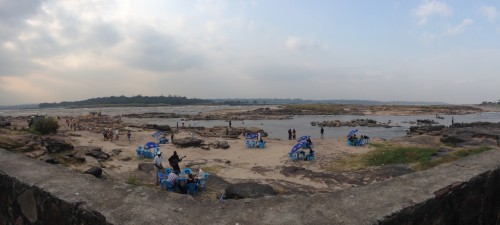
Ever get the feeling that the whole world’s privy to a joke you just don’t get? That sort of approximates my life in the sprawl of Kinshasa. For the next year or so, my wife Anne-Claire and I will call this notorious behemoth of a failed state home. I couldn’t be happier – to live in Africa again and sate a childhood fascination with the continent; to find stories to tell that no one else can; and to learn French. My current lack of fluency, in addition to many other aspects of life here, has me in a near-constant state of bewilderment.
I accompany my fluent-in-French wife to work every day and desperately try to follow what’s going on. As she deftly navigates a barrage of bilingual situations, I peck at adding something more useful than “OK, d’accord” or “Oui, ça c’est bon” to conversations. Meanwhile, my wife has charmed the local staff by learning a few phrases in Lingala. Heartened by her results, every once in a while, I get up the courage to start a conversation in French with one of the local staff, often going something like this:
Me (pointing to a tree heavy with yellowing fruit): Augustin, that is the trees of the mango, that one there, isn’t it?
Augustin (flashing a sympathetic smile): Yes, those are trees of the mango.
Me: And that one, this is some trees of the avocado?
Augustin: Oui. In French, trees of the mango are called “mango trees.” Trees of the avocado are called “avocado trees.”
Me: Ah, OK, d’accord. I see, I see. And Augustine, what season is it correct for the mango tree?
Augustin: Usually October here in Kinshasa.
Another local staff member (also smiling and listening to our conversation): This one, he speaks like a child. But his wife, she speaks French well and she’ll be speaking full sentences in Lingala in just a month or so.

I’m getting by and making myself more or less understood, though about nothing less obvious than “Hey, I sweat a lot here in the Congo,” or “Boy, people drive like they just broke out of prison in Kinshasa.” I tell myself that’s the way you learn a new language – by starting with what’s in front of you and working outward.
But the disparity in my language ability and my wife’s got me thinking about a talk I heard last spring at the Cognitive Neuroscience Society’s annual meeting in San Francisco, and I wonder if there’s an excuse…I mean, underlying reason, for why I’m so bad at French.
Neuroscientist Patricia Kuhl of the University of Washington has figured out that language learning starts early – very early in fact, as in while we’re still in the womb. Journals have been filled for decades with evidence for the superlative language-learning skills of children. “[Ages] 0 to 7, children are geniuses at acquiring one, two, three, or any number of languages,” Kuhl says. That’s nothing new. It seems intuitive to anyone who’s spent anytime around curious kids. Their brains are constantly absorbing and processing and linking what’s around them, so it only makes sense that language should be something they pick up easily. Plus, they often lack that fear (or, in my case, dinosaur-age level of petrification) of making a mistake.
What’s cool about Kuhl’s work is she’s shown that infants are basically born with the potential to discern sounds from all sorts of languages. She calls them “citizens of the world,” who are constantly logging statistical data about sound frequency and distribution and then molding their brains’ language abilities to what they hear most often. Interestingly, her recent research shows that babies are born pre-tuned to their mothers’ native tongue to some extent, after steeping in the muted sounds and vibrations of the womb for nine months.
In Kuhl’s earlier studies, infants from Japan and the U.S. up to about 8–10 months of age were able to recognize ‘r’ and ‘l’ sounds, which are common in English but not in Japanese. Beyond that 10-month mark, the Japanese children’s abilities to distinguish those sounds dropped off markedly. The 10-month-old American kids, however, were constantly bombarded with those sounds from their parents, so they had little trouble picking out ‘r’s and ‘l’s.
What’s more, Kuhl has figured out that these sound recognition abilities depend on human contact and not just auditory perception. Only infants who learn these sounds from an in-the-flesh person (often in the exaggerated-syllable baby talk that neuroscientists call “mother-ese”) can lock in this discriminatory ability.
Presumably, they’re integrating the auditory data with their visual perception of the lips they see moving to create those sounds. But just hearing the sounds in audio, or even seeing a person speak on a video, didn’t cut it. If a baby didn’t have someone making those sounds directly to them, they lost the ability to hear and pronounce them like a native speaker.
“The social brain is playing a very important role in learning,” Kuhl says, albeit in a way that’s not yet completely understood.
Can a Japanese person learn English after not having been exposed to English at that early age? Without question. But they might have to work harder to distinguish certain sounds. Or they might just have to resign themselves to the fact that they might never be able to say the hard ‘r’ in “try” or “barn” like a native English speaker.
And of course, it’s difficult to tease apart what might just be innate language acumen from (very) early language learning. My wife grew up speaking only English, though she was born in Paris to a Congolese-born, Luxembourgish polyglot father and an American mother fluent in French. Though her family moved to California when she was 8 or 9 months old, does her early exposure to native French help her today to speak the language?
Kuhl’s work suggests that it might. Some of her work with bilingual children demonstrates that their brains remain pliable and open to new languages beyond the linguistic-genuis years of childhood. “We think this flexibility may remain for a long time, maybe into adulthood,” she said.
It’s probably a bit of stretch to ascribe Anne-Claire’s French fluency to the sounds she heard in infancy. But I can attest, whether we’re riding bush taxis in Senegal or the pathways of Paris’ Jardin des Tuileries, native French speakers often assume she’s from a Francophone country because she’s so good at mimicking local accents. You should see the sideways looks she gets from francophone Europeans right after we’ve spent some time in Africa, owing to the affected speech patterns she absorbs from the former colonies.
Meanwhile, I struggle mightily just to pucker my lips (while trying to avoid spraying the table in front of me with saliva) when my language tutor corrects the ‘u’s in my ‘tu’s and ‘bu’s to the subtler French ‘eeuw.’ As Kuhl might say, I’m a “culture-bound” listener who will likely always struggle with the sorts of sounds that I didn’t hear as a baby. ‘R’s and ‘l’s are no trouble for me, but syllables scarcer in English are really tricky.
The counter-argument to culture-bound listening skills is my friend Nick’s story. Just like me, he grew up in a monolingual household with no early exposure to sounds outside the purview of Midwestern English. But, in the past decade or so, since his junior year in college, he’s spent more than 5 years in Mandarin-speaking China, Taiwan, and Hong Kong. As earnest as they come, he perfected a Beijing accent in Mandarin to the point where restaurants expect a Chinese Mainlander to show up after hearing him place an order or make a reservation by phone. He’s a smart guy, to be sure, but it’s hard to say whether his skill is the result of innate hard-wired ability or he’s just worked hard at it for a long time.
What is clear is that my 33-year-old brain is well past its prime language-learning stage. But there’s hope yet. The interesting commonality between Anne-Claire and Nick, despite the disparity in their early incubations, is their fearlessness in talking to people and making conversation. Mistakes be damned, they give their lips and voices the workout necessary to wrangle a new tongue.
I, on the other hand, turn phrases over and over in my head before I spit them out, even in English. It’s no coincidence that I became a writer. The chance to blissfully agonize (yeah, right) over word choice and sentence structure suits me well, so you can imagine the amount of self-editing and translation that I put into a second or third language. (Quick: Do I say, “I don’t speak French well” or “I don’t speak well French”? And is it “le français” or just “français”? Ah, crap…)

Kuhl believes that neuroscience is on the path to unlocking the language code, which she hopes might reveal other avenues to maintaining that child-like openness to learning in general. But maybe therein lies the solution to my tongue-tangled strife. It doesn’t really matter whether I say “…well French” or “…French well.” Ironically enough, I’d probably get the point across better if I didn’t say it correctly. To a baby, the overwhelming impetus to communicate stems from a desire to meet her needs, not to show off her perfect command of grammar.
And if I’m going to learn French – and I’m still hopeful that I will, even if my plodding American twang makes native speakers (and my wife) cringe or giggle endlessly – I should take on this child-like approach, even though it’s not likely to produce the same changes in my decades-old brain.
It’s perhaps the best strategy, and really, the only one I have at this point. So I’ll continue to chug forward, resigned to learning a few words each day and Captain-Obvious conversations about plants, in which I try to pick up as much as I can. Though, I figure it’s probably best to avoid wide-eyed, infantile staring at people’s lips, drool pooling on my shirt collar, lest I send the wrong signal…
****
John Cannon is a freelance writer interested in science, travel and the developing world. For the next year, he will be based in central Congo.
Photo Credit: John Cannon
I know exactly how you feel as someone learning Spanish late in life. Occasionally I do feel that there is something wrong with my brain. I’ve noticed that it’s easier to learn vocab around something you love – in my case rock climbing. For a while there it was the only think I could talk intelligibly about.
John, I feel your pain re your 2nd language frustration. I have it in spades. Have visited my Amsterdam son ~10 times and still have down pat only one Dutch word, that being
“dankjewel” (thank you). Used to know the days of the week, but now some have slipped away. Happily, both my A’dam son + another in Toulouse have your wife’s talent for new languages. What we wouldn’t give to have it, too! Meanwhile, good luck in the Congo!
This is so solid! My wildlife researcher husband and I moved to Quebec City (from the U.S. Mountain West) approx. 2.5 years ago. It has taken all that time to become semi-fluent in French (THE language of this city), and John’s descriptions of what it’s like to compare yourself to others who are better at the language, and to yourself in your native language, are spot on. Keep it up, though, John. It’s worth it, and as a writer with a strong vocabulary, you’ll be repeatedly pleased to realize how many words are similar in English.
Keep up the good work! Wish I would have known the research- I would have provided a more diverse incubator! : o)
It is interesting to hear your struggles but to hear success between the lines. I share your midwest ears and learning channels. But everyday experiences are the paths to life learning. Here in cental Ohio I am having an opportunity to also share an experience outside my everyday. As an architect with the local school district I am planning and constructing new school facilities – one of these projects is work on a language immersion school – Ecole Kenwood. We are starting K-3 in the 100% language circulum , in this case french. I get to meet with staff and see the school operating and listening to spoken French and all the various accents that the teachers bring to the program. At grades 4-6 English grammar instruction is reintroduced to stay current with standard circulum goals. On graduating to 7-12 they go to a full language high school and are introrduced to students coming from the Spanish language school program with hopes for a Chinees Mandarin program. Our International High School program covers all the normal math science course work but in the day there are three seminars of language oriented course work. For me fitting an everyday profession of making physical facilites available and learning if any special concessions are needed keeps me alert and challenged. I am seeing such small every day experiences as a graphic package that will work for the language program as well as visitors, and a library where French textbooks are stacked along with English doubling the needed space (SF area) book for stacks.
Thanks for sharing your thoughts – our best and warmest wishes for a great unique experience to you and Anne Claire.
A fun post, John, and one that I certainly can identify with. (Or in the best English, “one with which I can certainly identify”. Don’t end a sentence with a preposition…)
I speak so-so German and Spanish, but have never reached any sort of fluency, although after a month in Germany in 1980 and a month in Mexico in 1987 I was so much more comfortable and doing less translating and more speaking and thinking in the language.
Like you, I hate to sound daft, which then leads to my working out the sentences in my head in English, and then translating it. But that’s not really speaking the language and it often comes out wrong anyway.
I remember reading a few years back that adults could learn a language better, at least in a classroom setting, by having a glass of wine or a beer. It made them looser and less fearful of appearing silly in front of others, and in fact more receptive to really speaking a language.
So there’s your secret formula, John – drink and learn!
It’s great to read your words from Africa.
Great article, John. I hope my future husband who is from Mexico and I will be able to contribute to the field of linguistics with our (hopefully) bilingual children!